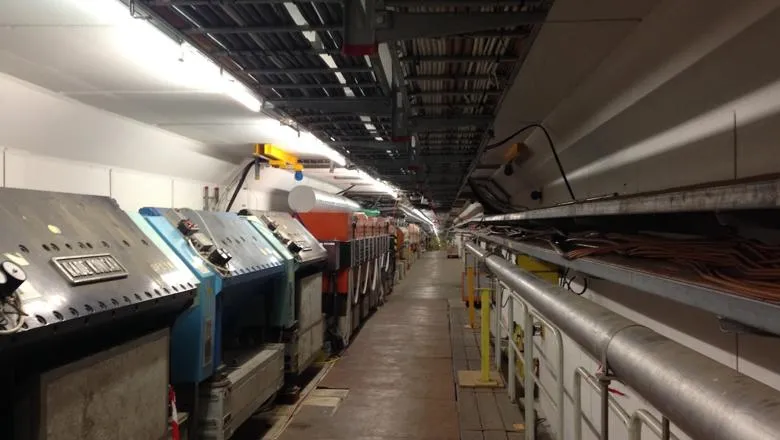11 August 2016
King's academics working on the LHC MoEDAL experiment co-publish the first paper on the search for magnetic monopoles
Over the last decade, researchers have been trying to find evidence for magnetic monopoles at accelerators including CERN’s Large Hadron Collider. MoEDAL is an experimental group based at CERN dedicated to this search and in their first published paper, in the journal JHEP, the authors explain that they have narrowed the window of where to search for the elusive particle.

The Theoretical Particle Physics and Cosmology group of the Department of Physics at King’s College London is a key player in MoEDAL's exciting physics programme. This is highlighted by the leading roles that its members, Nick E. Mavromatos and John Ellis have as MoEDAL's Physics Coordinator and as the Chair of its Theory Board, respectively.
The JHEP paper is based on an analysis of data collected during the LHC’s first run. Although showing no evidence for trapped monopoles, the results have allowed the MoEDAL collaboration to place new mass limits, assuming a simple production mode of these hypothetical particles. They also provide a clear demonstration of the power of the MoEDAL detector, as the LHC delivers data at higher energy.
“In addition to magnetic monopoles, the experiment has great potential for discovering other highly ionising particles predicted by many new physics models, ranging from supersymmetry to string theory”, says Physics Coordinator of MoEDAL, Nick E. Mavromatos of King’s College London.
The MoEDAL collaboration is now actively working on the analysis of data obtained in 2015 with the exciting possibility of revolutionary discoveries in a number of new physics scenarios.
To read more about the MoEDAL experiment, you can read CERN's news article.
Over the last decade, researchers have been trying to find evidence for magnetic monopoles at accelerators including CERN’s Large Hadron Collider. MoEDAL is an experimental group based at the LCH dedicated to this search and in their first paper, published by the journal JHEP, the authors explain that theyhave narrowed the window of where to search for the elusive particle.
The Theoretical Particle Physics and Cosmology group of the Department of Physics at King’s College London is a key player in MoEDAL's exciting physics programme. This is highlighted by the leading roles that its members, Nick E. Mavromatos and John Ellis have as MoEDAL's Physics Coordinator and as the Chair of its Theory Board, respectively.
The JHEP paper is based on an analysis of data collected during the LHC’s first run. Although showing no evidence for trapped monopoles, the results have allowed the MoEDAL collaboration to place new mass limits, assuming a simple production mode of these hypothetical particles. They also provide a clear demonstration of the power of the MoEDAL detector, as the LHC delivers data at higher energy.
“In addition to magnetic monopoles, the experiment has great potential for discovering other highly ionising particles predicted by many new physics models, ranging from supersymmetry to string theory”, says Physics Coordinator of MoEDAL, Nick E. Mavromatos of King’s College London.
The MoEDAL collaboration is now actively working on the analysis of data obtained in 2015 with the exciting possibility of revolutionary discoveries in a number of new physics scenarios.

